2025 Local food report
Learn about the people, businesses and organizations strengthening Ontario’s local food economy.
Minister’s message
As the Minister of Agriculture, Food and Agribusiness, I am honoured to recognize the hard work of Ontario farmers and our agri-food sector during this year’s Local Food Week. Growing up and living in a farming community, I have witnessed and experience the value of farming firsthand. I understand and appreciate the commitment, skill and dedication it takes to grow, harvest and make food all year round.
I know many people across the province are feeling concerned and uncertain about the future. I heard this directly from 175 agri-food stakeholders at the fourth annual Grow Ontario Food Summit held on April 11, 2025. I remain deeply committed to protecting Ontario by supporting our farmers, our food businesses and the whole agri-food sector as we weather the storm caused by President Trump’s tariffs. The agri-food industry in Ontario contributes nearly $51 billion to the province’s GDP and employs over 871,000 people - representing 1 in 9 jobs. With 48,346 farms producing more than 200 different commodities, Ontario is a leading producer of food and currently, providing 54% of the food consumed in Ontario.
If we work together, we can forge a strong path ahead and ensure we build a strong food supply chain for decades to come. We already have a roadmap for our sector through the Grow Ontario Strategy, launched in 2022. Developed in collaboration with dedicated farmers, producers and food industry leaders, the strategy sets bold targets to enhance Ontario’s food supply chain, address vulnerabilities and reinforce the province’s role as Canada’s leader in food production. The 10-year goal to increase the production and consumption of food grown and prepared in Ontario by 30% is well underway and the Foodland Ontario program is leading the charge. At a time when interest in supporting Canadian businesses is higher than ever, research shows that 85% of consumers recognize the Foodland Ontario logo, making it the trusted brand of shoppers when identifying locally grown and made foods.
Buying local is more important now than it has ever been before. That is why we are highlighting food entrepreneurs in this year’s Local Food Report. They are the innovators and the force behind Ontario's local food sector growth. Fueled by that spark of an idea, research, new production practices and technology adoption, food entrepreneurs may start in many different places, but the goal of producing outstanding products is always at the core of their business. We are deeply grateful for our agribusinesses, farmers, food processors, manufacturers, retailers, distributors and everyone across the local food supply chain.
We know that buying local food doesn’t just taste better. When we choose to purchase what is grown and made right here at home, we are supporting our farmers and our communities, strengthening our economy, our province and our country. I invite you to read this year’s Local Food Report and help us protect Ontario’s local food supply chain. From your fruits and vegetables, fish, meat, poultry and dairy products, to speciality items like maple syrup and honey – good things grow in Ontario.
Trevor Jones
Minister of Agriculture, Food and Agribusiness
Boosting local food literacy in Ontario
A key to achieving the local food goals outlined in the Grow Ontario Strategy and protecting our agri-food industry is building local food literacy. Foodland Ontario leads the way in educating consumers on how to identify and choose to buy locally grown and made food.
For almost 50 years, Foodland Ontario has been the trusted source for identifying locally grown and made food in grocery stores, farmers’ markets and on-farm markets. Promoting Ontario foods, including fruits, vegetables, meat, dairy, eggs, processed foods and other food products in new and creative ways is what this brand is known for.
Local means knowing where your food comes from. With Maple Syrup, it means seeing the maple trees where the sap is harvested and being assured the forest is managed sustainably. The Foodland Ontario brand is widely recognized by customers. Marketing material like signage, recipe cards and social media posts reassure customers that our maple syrup products are local and of high quality.
Lori Costello, maple syrup producer and owner of Bella Hill Maple Syrup in Nipissing, Ontario
A key approach to maximizing connections with consumers and creating demand for Ontario food that Foodland Ontario takes is through mass advertising, for example, primarily digital and radio and social media like Facebook, Instagram, X, YouTube and Pinterest. Foodland Ontario invested $3 million into a comprehensive advertising campaign and generated over 200 million consumer impressions, with in-store radio ads in retail grocery stores reminding consumers to buy local food while shopping.
Additionally, the newly launched buy local map helps consumers find more locally grown and made food in every community. Foodland Ontario also organized 425 sampling events in grocery stores so far in 2025, making it easy for shoppers to know what is locally grown and where to find local food.
Foodland Ontario also plays a vital role in helping entrepreneurs in the agri-food sector promote their products and connect with consumers. By leveraging its established and trusted brand and resources, entrepreneurs can effectively market local goods, increase visibility and grow their businesses through brand recognition and credibility, marketing and promotional support, retail partnerships and education and consumer awareness. Currently, there are almost 1,700 food businesses that use the Foodland Ontario logo on their products.
Beverly Greenhouses
The Ontario Greenhouse Vegetable Growers has more than 170 members growing tomatoes, peppers, cucumbers and strawberries on almost 4,000 acres across the province. One of the province’s largest greenhouse cucumber growers, Beverly Greenhouses, has been growing long English cucumbers for over 60 years. Based in Waterdown, this fourth-generation family business is currently co-owned by the brothers Jan and Dale VanderHout.
This operation started with a quarter-acre of greenhouse space, with several expansions over the years, including a major one in 1996 and further expansions in 2005, 2006, 2012 and 2017. Currently, the greenhouse sits on a 30-acre plot and has 170,000 plants growing at any given time.
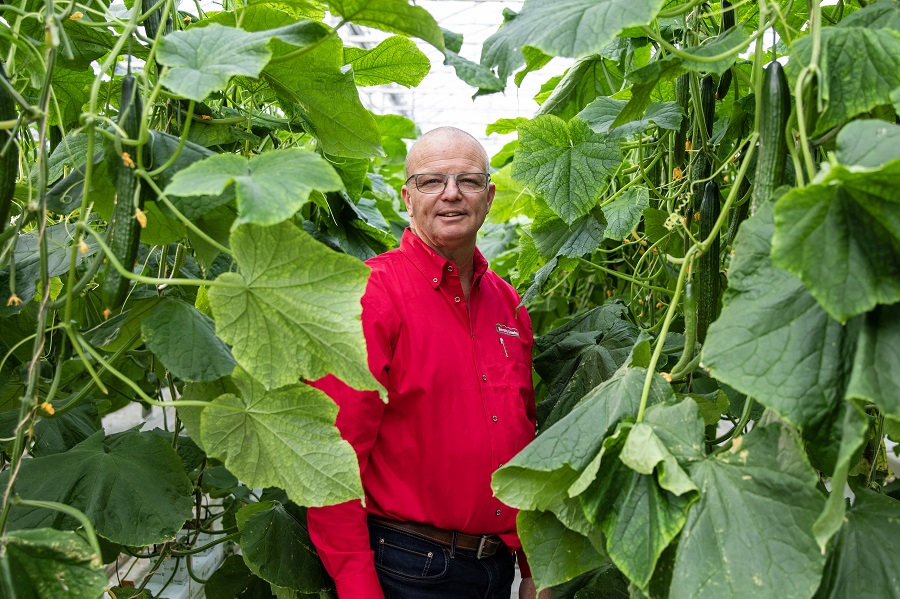
Beverly Greenhouses is committed to supporting local food production. One of the ways they achieve this is by using the Foodland Ontario logo on their packaging, making it easier for consumers to identify and choose Ontario-grown cucumbers while shopping.
We use the Foodland Ontario brand to let people know that they are buying genuine local produce that they can enjoy knowing that it was produced in professional manner right here near to their home. Consumers need to be confident that they are making a healthy choice.
Jan VanderHout, co-owner of Beverly Greenhouses.
A key success for the business is using a vertical integration strategy, allowing them to control all aspects of the operation from seeding, planting and growing to harvesting, packaging and then to shipping, while the marketing and distribution is managed through an external partner. The vertical integration strategy means that they can also maximize sustainable farming techniques like using wood biomass for heating, recycling water and nutrients to minimize waste and solar installations that keep power generation on-site to ensure efficiency and productivity.
Growing agritourism in Ontario through direct farm marketing
Agritourism is growing consumer awareness of and interest in what we grow and make, right here in Ontario. As an industry, it is ripe for growth as it offers farmers a way to diversify their income. For some entrepreneurial farmers, blending agriculture with tourism on their property offers endless possibilities to innovate, connect and grow their business while still contributing to the province’s vibrant agricultural landscape.

However, one challenge that many agritourism operators faced was significant increases in liability insurance costs and the potential for lawsuits. In December, the Growing Agritourism Act, 2024 was passed, helping to address these issues. The act provides a layer of protection for farms with agritourism operations that welcome the public onto their property to enjoy and learn about Ontario’s agriculture industry.
In 2024, Agritourism Ontario received up to $345,000 over 3 years to help conduct a growth study, support marketing and build a digital app that promotes agritourism in Ontario by connecting families to farms. With more than 300 members across Ontario, experiential learning about Ontario’s local food system has never been easier.
For Agritourism Ontario members, local means grown and produced in Ontario. We take extraordinary pride in supporting each other by selling other members' products in their on-farm markets as well as other locally crafted items. Connecting families to farms is what we do and with the wonderful support of Foodland Ontario, it is truly a win-win for farm owners, customers, municipalities and Ontario.
Kevin Vallier, CEO, Agritourism Ontario
For some, shopping at a farmers’ market and on-farm market is a great introduction to agritourism as it is an easy way to connect directly with farmers and food entrepreneurs. The first farmers’ market was established in Kingston, Ontario, in 1801. Today, Farmers’ Markets Ontario (FMO) represents over 180 farmers’ markets across the province.
Farmers’ Markets Ontario is committed to enhancing public engagement with local food systems, which is a cornerstone of agritourism. By fostering connections between consumers and producers, farmers’ markets play a pivotal role in the growth of Ontario’s agritourism sector.
Catherine Clark, FMO executive director
Downtown Windsor Farmers’ Market
FMO recognized the Downtown Windsor Farmers’ Market (DWFM) as Market of the Year for their excellence in authenticity, customer experience, commitment to food safety, weekly entertainment and show-stopping events. But it is their Good Greens Food Reclamation program that puts the spotlight on this market. This program took over 12,000 pounds of fresh produce, 3,300 baked goods and 15,000 millilitres of preserves and turned them into 16,000 meals for Windsor’s most vulnerable. Additionally, the DWFM provides free vendor spots for non-profit organizations, giving them a platform to raise awareness and connect with the community.
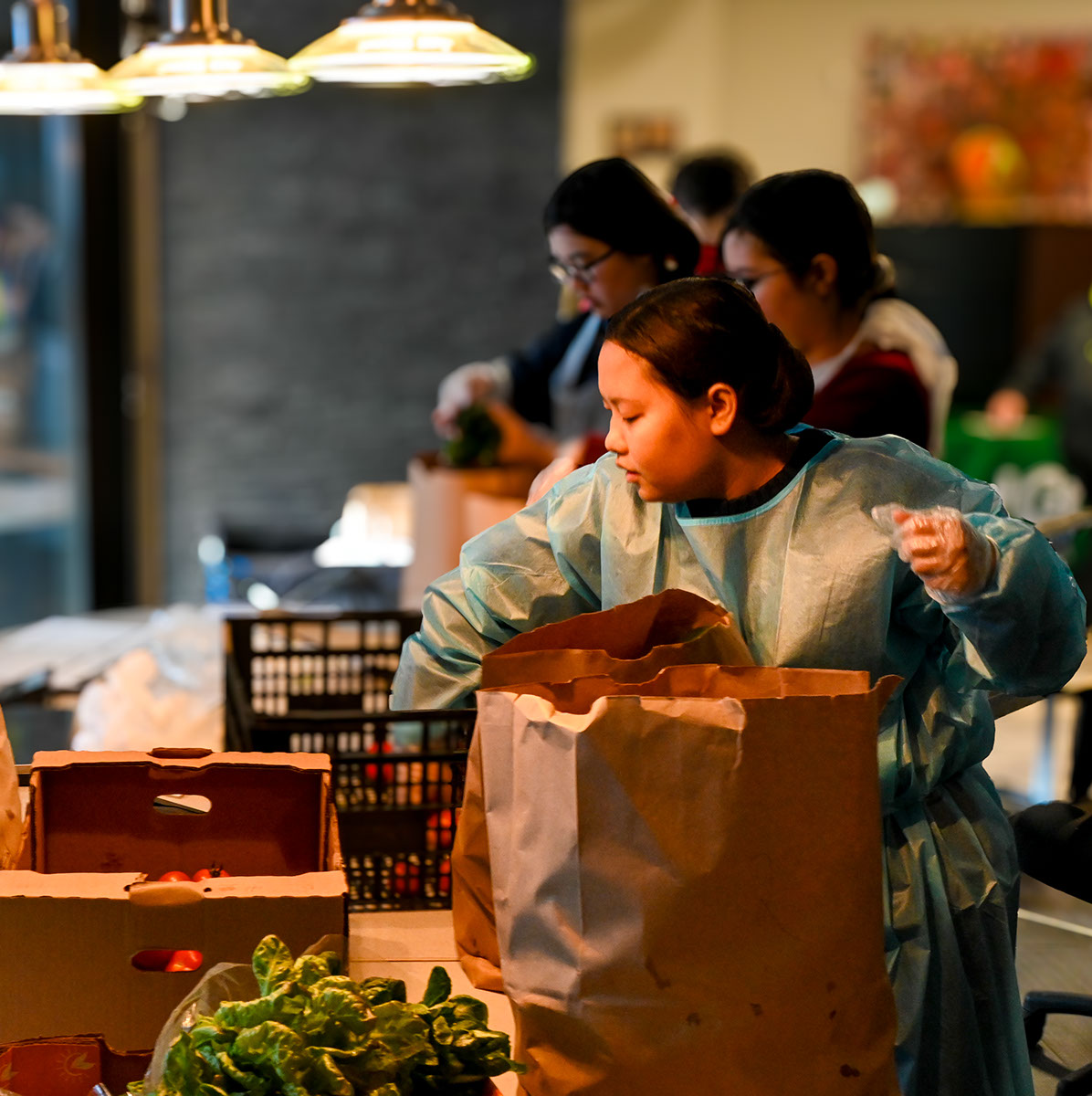

Partnering with Foodland Ontario reinforces our commitment to authentic, local food and the farmers who grow it. At the Downtown Windsor Farmers’ Market, ‘local’ means more than geography — it means community, culture and care. Every vendor, every meal and every initiative like Good Greens reflects our belief that food should nourish people and build connections.
Debi Croucher, executive director of the Downtown Windsor BIA
DWFM is also part of Farmers’ Markets Ontario’s MyPick Verified Local Farmer program, an authenticity program that provides confidence to shoppers that the products sold by the vendor are direct from their farm. Knowing that you are buying direct from the farmer and not a reseller is an important part of supporting local agriculture.
For FMO and its members, safeguarding the integrity of 'local' is key, we are ensuring consumers receive authentic, high- quality products while strengthening Ontario’s agricultural community.
Catherine Clark, FMO executive director
Thames River Melons
What started as an experimental acre of uncommon cantaloupe crops planted in 1984 has grown into a 500-acre agribusiness over the past 40 years.
Now, Rob Chesney and his family grow dozens of different fruits and vegetables at Thames River Melons, from springtime rhubarb and asparagus, summer strawberries and melons, to fall squash and pumpkins. As entrepreneurial farmers, diversification like this means that they can meet market demands while using sustainable agriculture practices.
To us, local is about not just the food, but also the people. Local means food that’s grown with care, in our backyards, by hardworking, caring and dedicated community members. Local means connecting with others across a farmers’ market table, in a pumpkin patch or next to a pile of Ontario-grown strawberries in a grocery store aisle. Local means bringing your favourite dish to your neighour’s backyard BBQ, featuring the freshest peak-season ingredients.
Alex Chesney, Thames River Melons
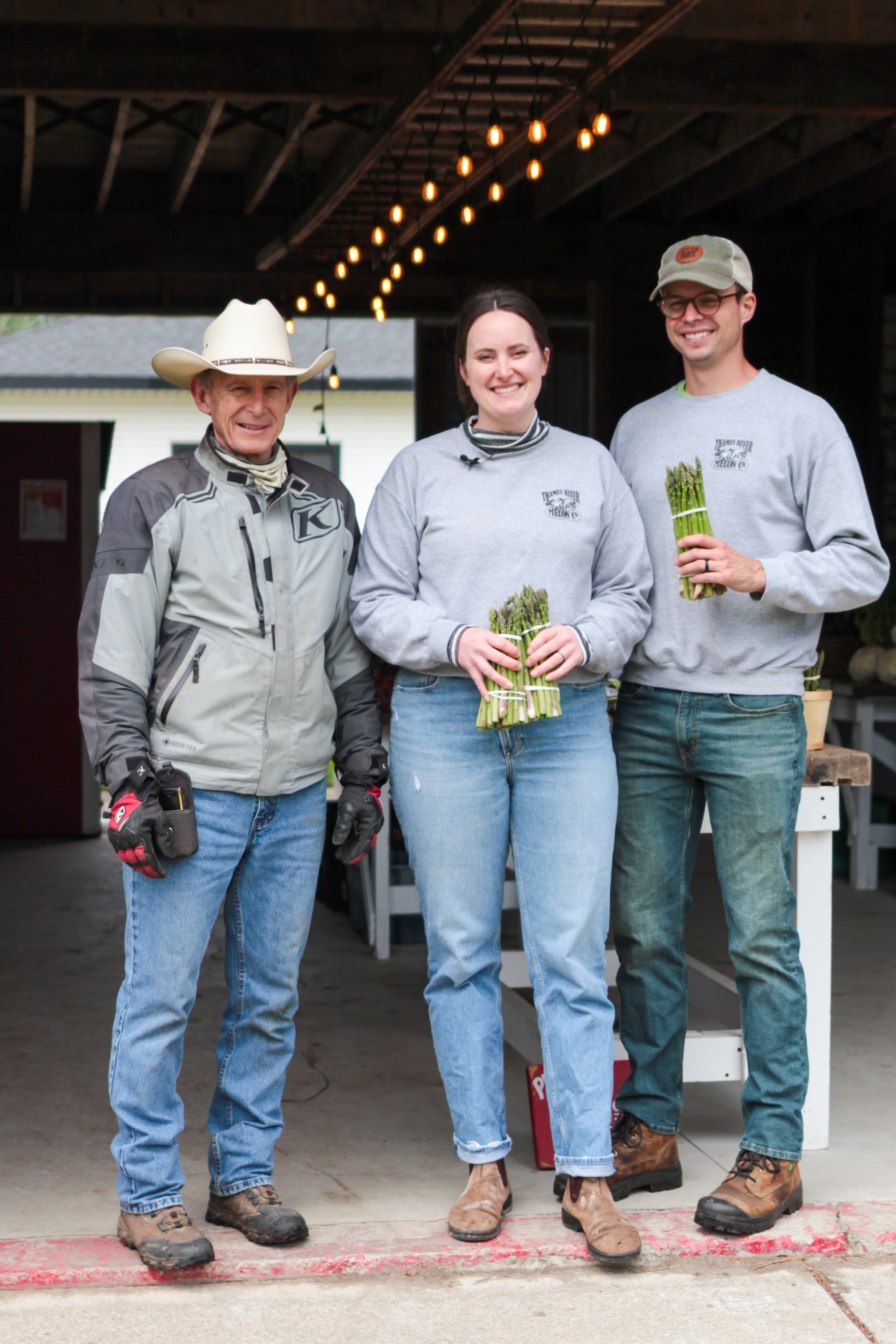
Entrepreneurs are often considered nimble in business because they are willing to be flexible to ensure their business continues to grow. Agritourism offered Thames River Melons an additional opportunity to diversify by providing ways for consumers to connect directly with their food sources, including a pick-your-own produce patch, walking trails, farm-to-table events and a children's play area on their farm. They’ve also added the Farm Kitchen, which makes and sells homemade baked goods and ready-to-eat meals and the latest addition of the Farm Food Truck. Serving fresh-cut French fries, old-fashioned milkshakes and smash burgers made with the farm's black Angus beef offers visitors a farm-to-table dining experience.
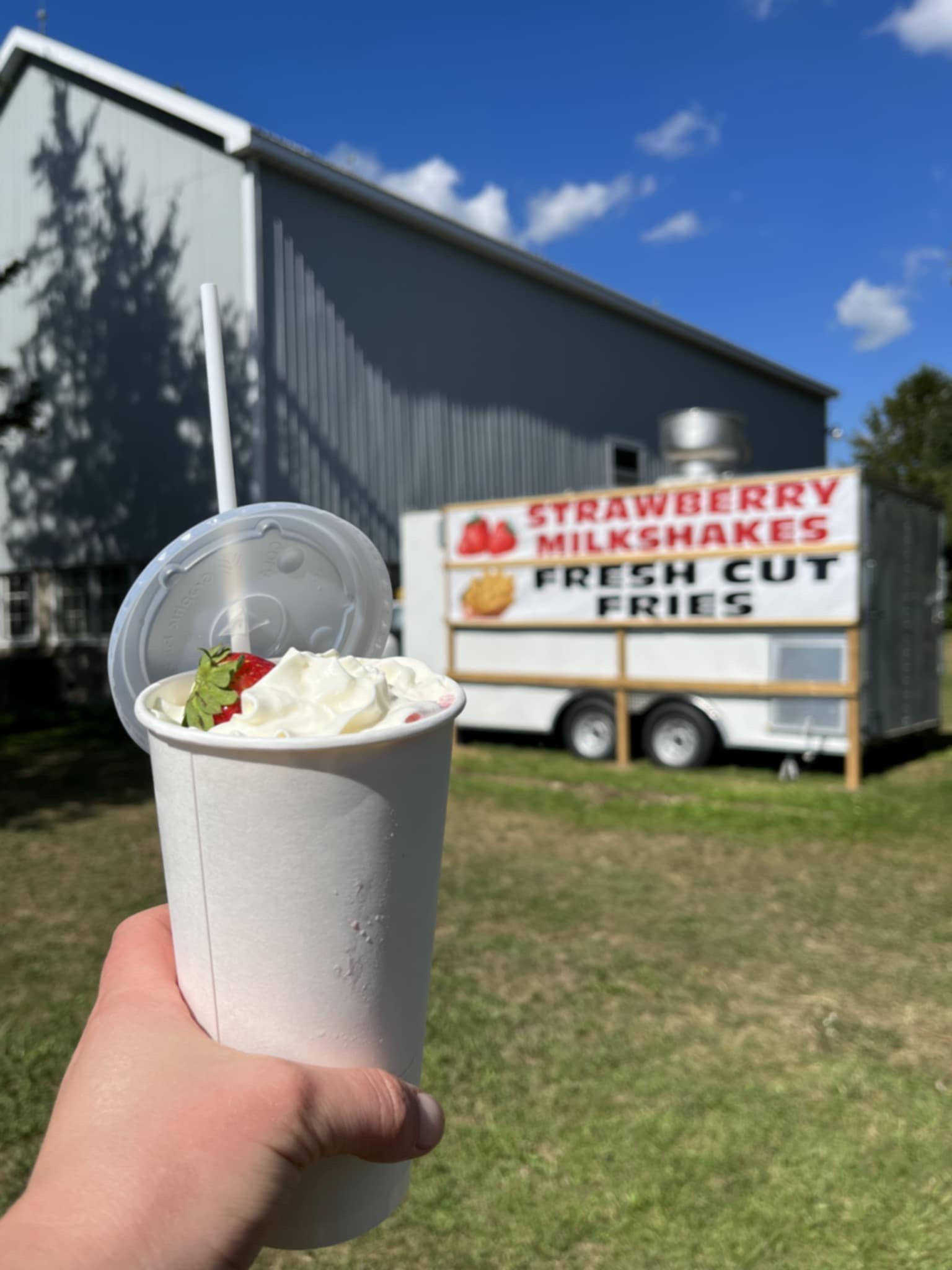
Thames River Melons are also proud partners with Foodland Ontario.
Foodland Ontario is a leader in promoting and marketing locally grown and produced food and we look forward to seeing and using their signage each season and hearing their radio ads promoting the latest fruit or vegetable that’s making its way onto shelves near you. Good Things Grow in Ontario is the catchiest slogan and a reminder we need now more than ever.
Alex Chesney, Thames River Melons
Improving local food access
Buying local food is good for communities and the province because it supports local farmers and businesses, keeping money within the community, creating jobs and protecting our local food supply chain. That’s why we are committed to increasing the production and consumption of local food.
Foodland Ontario Retailer Awards program
Foodland Ontario works with grocery stores to grow consumer awareness of Ontario foods. From the meat counter to store shelves, Foodland Ontario’s retail merchandising program ensures consumers can easily identify and purchase Ontario-produced fresh foods in retail grocery stores. Foodland Ontario’s Retailer Awards program celebrates grocery stores that build eye-catching displays to help consumers identify locally grown, in season fruits and vegetables.
Each year, stores submit photographs of their creative displays to compete for Platinum, Gold and Silver Awards. The prestigious Foodland Ontario Award of Excellence may also be awarded to up to 4 of the top Ontario retailers in recognition of consistent merchandising achievement over 2 consecutive years.
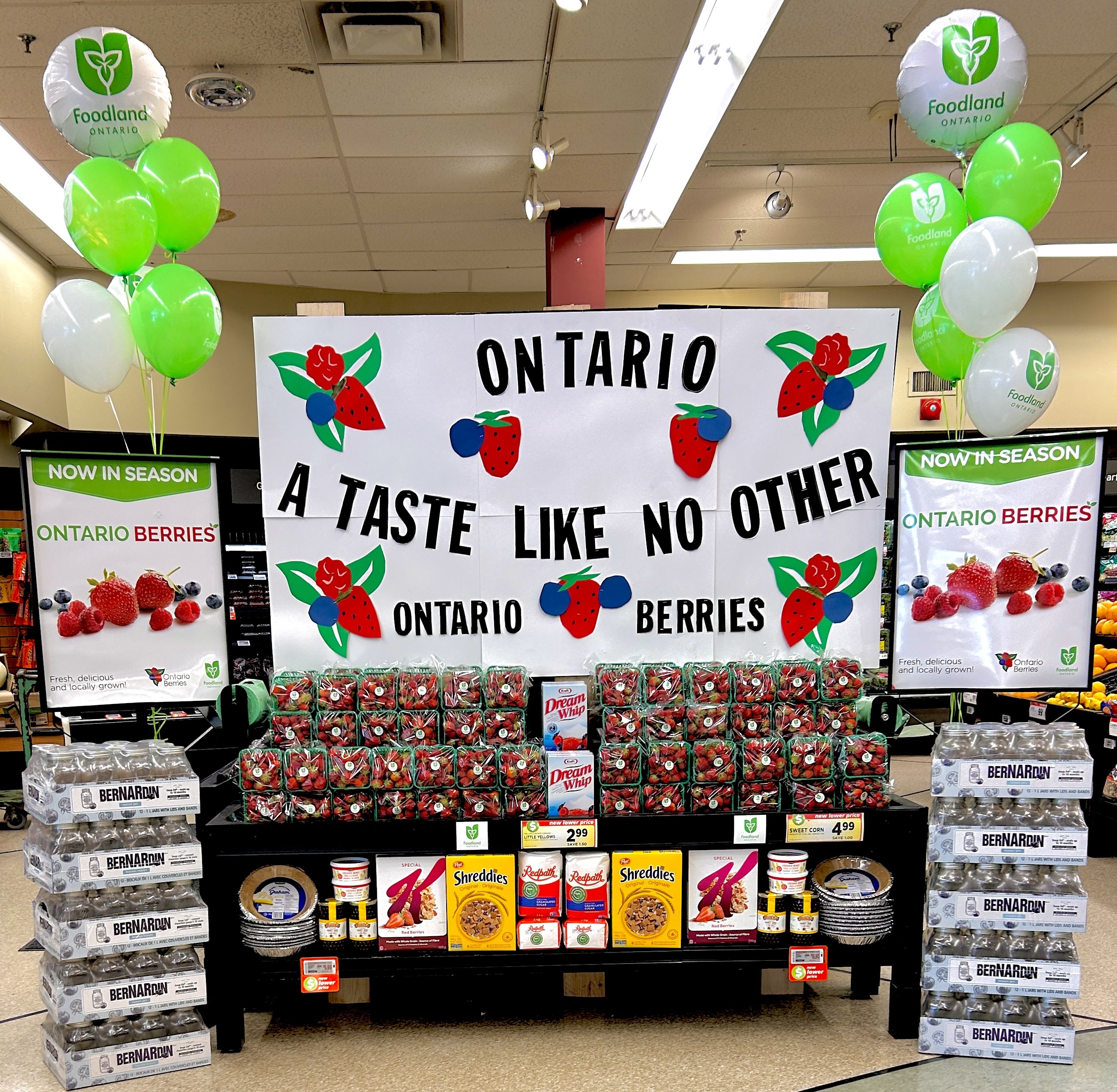
In 2024, 60 grocery stores received 64 awards, with special acknowledgement of 4 stores receiving a Foodland Ontario Award of Excellence in addition to receiving the Platinum Award.
Vendor programs
An important part of increasing access to local food is supporting Ontario food entrepreneurs to gain access to larger markets like grocery store chains. Through industry events like Grocery Innovations Canada, we offer opportunities to small and medium-sized food companies to showcase their products, have business-to-business meetings and connect with potential buyers.
Farm Boy Inc., a specialty food retailer headquartered in Ottawa and founded in 1981, emphasizes a farm-to-table approach, ensuring high-quality, fresh products for its customers. Operating over 50 locations across the province, they offer a wide range of products including farm-fresh produce, butcher-quality meats, dairy, deli, bakery items and more. The stores are designed to provide a unique and friendly shopping experience, often featuring in-store kitchens and eating areas.
As a long-time partner and supporter of Ontario suppliers, Farm Boy has participated in buyer/supplier meetings organized by Ontario government staff at the Restaurants Canada trade show for the past 2 years. From those vendor engagement programs, 5 buyers took 39 meetings with Ontario food and beverage manufacturers and from information provided by the buyers, 22 local companies are expected to have their products listed in Farm Boy stores. There is also interest in sourcing products from another 13 companies.
St-Albert Cheese Co-operative
As one of the oldest co-operatives in Canada, St-Albert Cheese Co-operative knows what it means to be a food entrepreneur and how important local food is to Ontario’s economy. Beginning with a visionary Franco-Ontarian cheesemaking group in 1894, St-Albert Cheese Co-operative spans 5 generations of farmers and craftsmen who have faithfully lived up to the St-Albert tradition of quality. Currently, the dairy co-operative is owned by 35 member farmers and is considered the second-largest cheese curd manufacturer in Canada, behind Saputo.
The early years were challenging, as the dairy business grew from a “cottage industry” into a multi-billion-dollar industry. But it was their dedication to quality and support for the community that enabled them to grow and prosper. By the mid-20th century, St-Albert Cheese had made a name for itself with its famous cheddar and cheese curds, selling in grocery stores across the country. They can be found at Costco and as far away as Japan, Barbados and Abu Dhabi.
In 2013 a fire devastated the St-Albert facilities. Everything was lost — but the community response was overwhelming. With help from local farmers, the government’s Eastern Ontario Development Fund and the dedication of its members, St-Albert Cheese was rebuilt by 2015. With a new and more modern production facility, the rebuild included an observation deck, restaurant and retail space that visitors enjoy each year. Whether touring the facility or purchasing delicious local products to enjoy at home, St-Albert continues to offer what people are looking for.
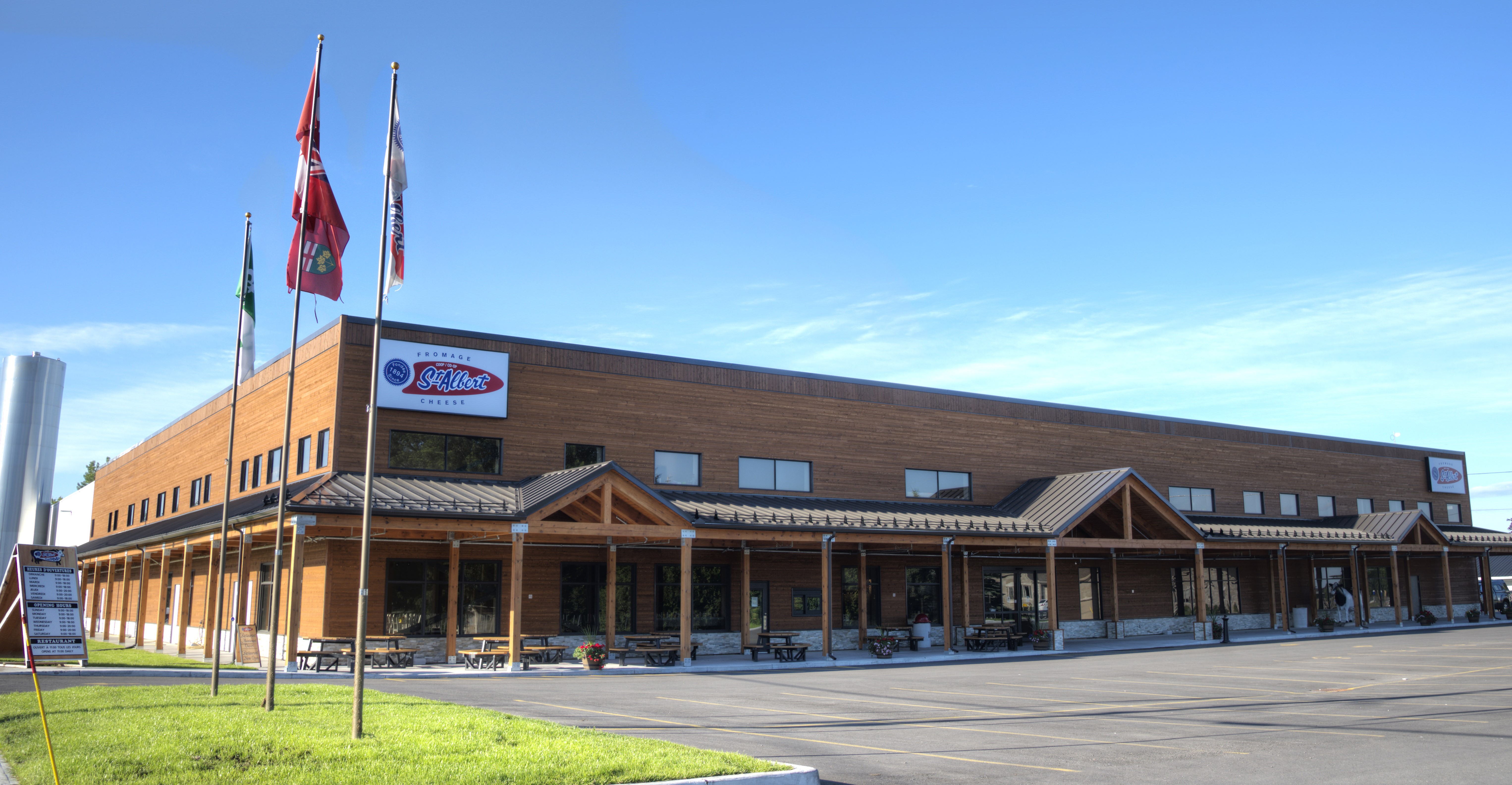
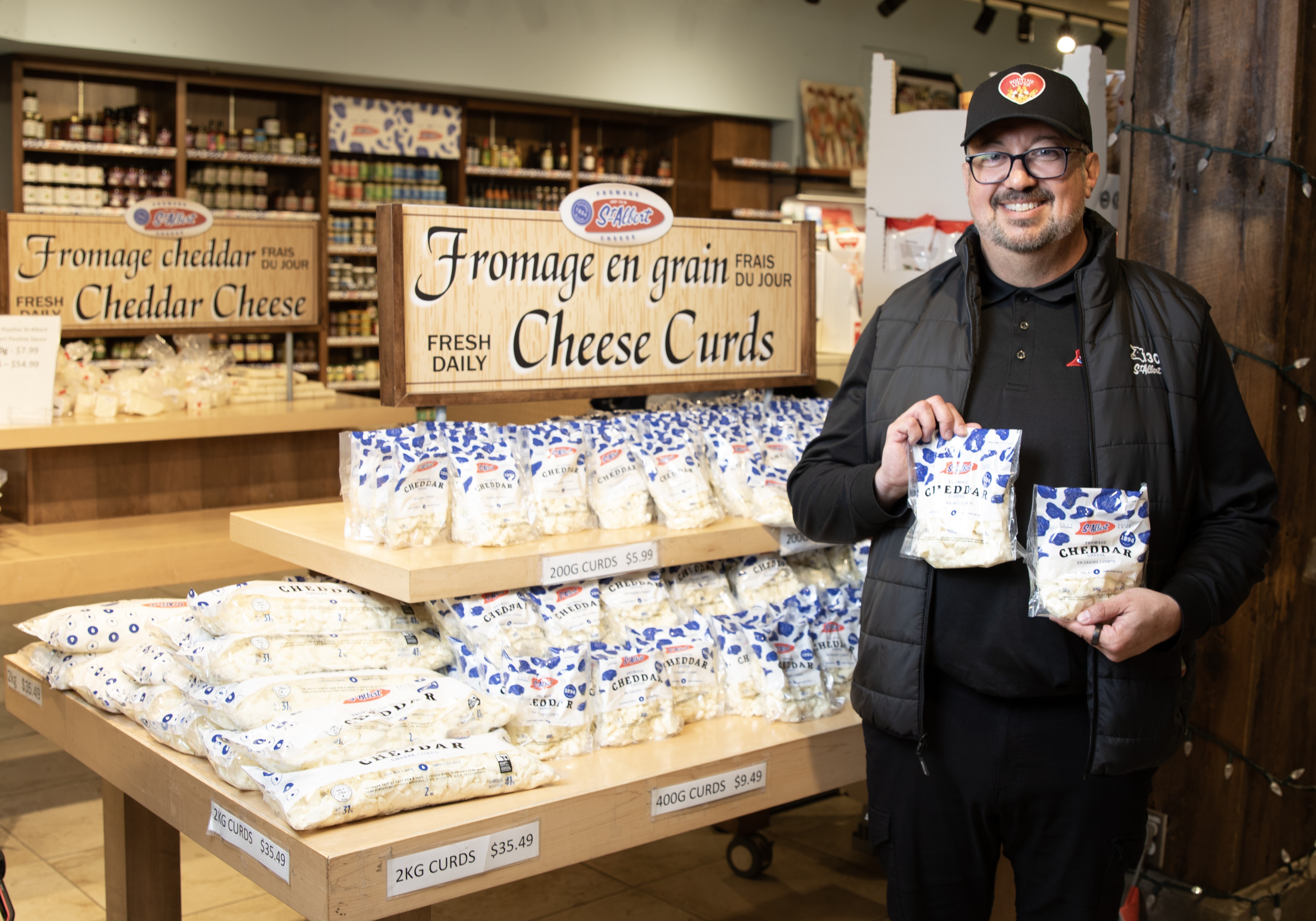
Today, St-Albert Cheese continues to produce cheeses that are a source of pride for Ontarians. They have grown from a small local operation into a world-class producer of premium Ontario cheese. They are one of the largest employers in the municipality, with 220 people making cheese 7 days a week. In a single day, they make about 12 tonnes of cheese curds, which ends up on a lot of poutine — a classic Canadian dish.
When you're buying local food made in your province, you're supporting your neighbors. You're supporting your society. You're helping it progress and move forward as a community.
Éric Léveillé, business development director, St-Albert Cheese Co-operative
The co-operative’s success shows how local food businesses can overcome challenges and highlights the importance of community and collaboration in the agribusiness sector. St-Albert Cheese’s story is not just about cheese; it’s about heritage, resilience and the power of collective effort. As Ontario’s local food sector evolves, St-Albert Cheese remains a beacon of excellence, inspiring future generations of agribusiness entrepreneurs.
Arvinda’s Indian Spice Blends
Featured at Salon International de l'Alimentation Canada (SIAL Canada) 2024, Arvinda’s Indian Spice Blends is a family-run food entrepreneurial business that has grown into a leading maker and designer of distinctive Indian spice mixes for the Ontario market, such as Curry Masala, Tikka Masala and Butter Chicken Masala, artfully blended with organic Ontario garlic.
At Arvinda’s, our vision is to ignite passion and joy for incredible spices, emboldening people to unleash their tremendous flavours and power for good health. We created Arvinda’s expertly balanced Indian spice blends to give consumers a truly authentic, fresh and healthy Indian cooking experience for great tasting Indian meals at home. From the beginning, our core value is to support local farmers using our world-class Ontario ingredients and with the use of organic Ontario garlic we created an innovative product which is a part of Arvinda’s identity that we take pride in. The maple leaf in Arvinda’s logo is a symbol of our dedication and commitment to manufacture and support local food.
Preena Chauhan, co-founder of Arvinda’s

Arvinda Chauhan and her daughter Preena Chauhan started teaching Indian cooking classes in 1993 with a passion for authentic Indian cuisine and a mission to share traditional cooking with Ontarians. Several years later Preena, along with her brother Paresh Chauhan co-founded Arvinda’s Indian Spice Blends. They have grown the business to include a more diversified spice blend collection, digital cooking classes and an online store. Their debut cookbook New Indian Basics won a Taste Canada Award, also earning a spot on the top 10 cookbooks list of 2022 in addition to being selected for the national exhibition Eat Make Share: A Taste of Immigration, at the Canadian Museum of Immigration at Pier 21. Arvinda’s products are now available at a number of popular grocery chains including Farm Boy and Sobeys across the province.
Foodpreneur Lab
Foodpreneur Lab is a Canadian nonprofit, based in Ontario, that is transforming the food industry by breaking down systemic barriers for underserved food entrepreneurs. Through culturally relevant programming and personalized business development support, Foodpreneur Lab empowers participants to bring their unique food ideas to market and scale existing products to new heights, focusing on respecting lived experiences, heritage and innovation.
Since 2019, the organization has helped launch and grow more than 200 food ventures across Ontario, supporting founders to scale sustainable businesses and bring culturally grounded products into the mainstream market. One of those businesses is Nerpy’s Inc., a standout Ontario success story. Known for its bold Caribbean-inspired hot sauces and seasonings, Nerpy’s began as a small food business and has since expanded its product line and retail reach. Today, their all-natural, gluten-free and vegan products are stocked in major retailers including Metro, Farm Boy and Sobeys.
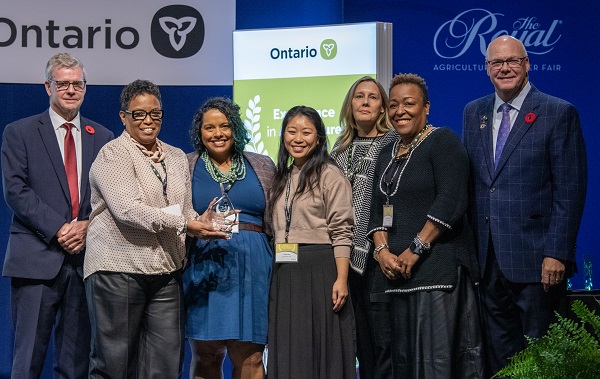
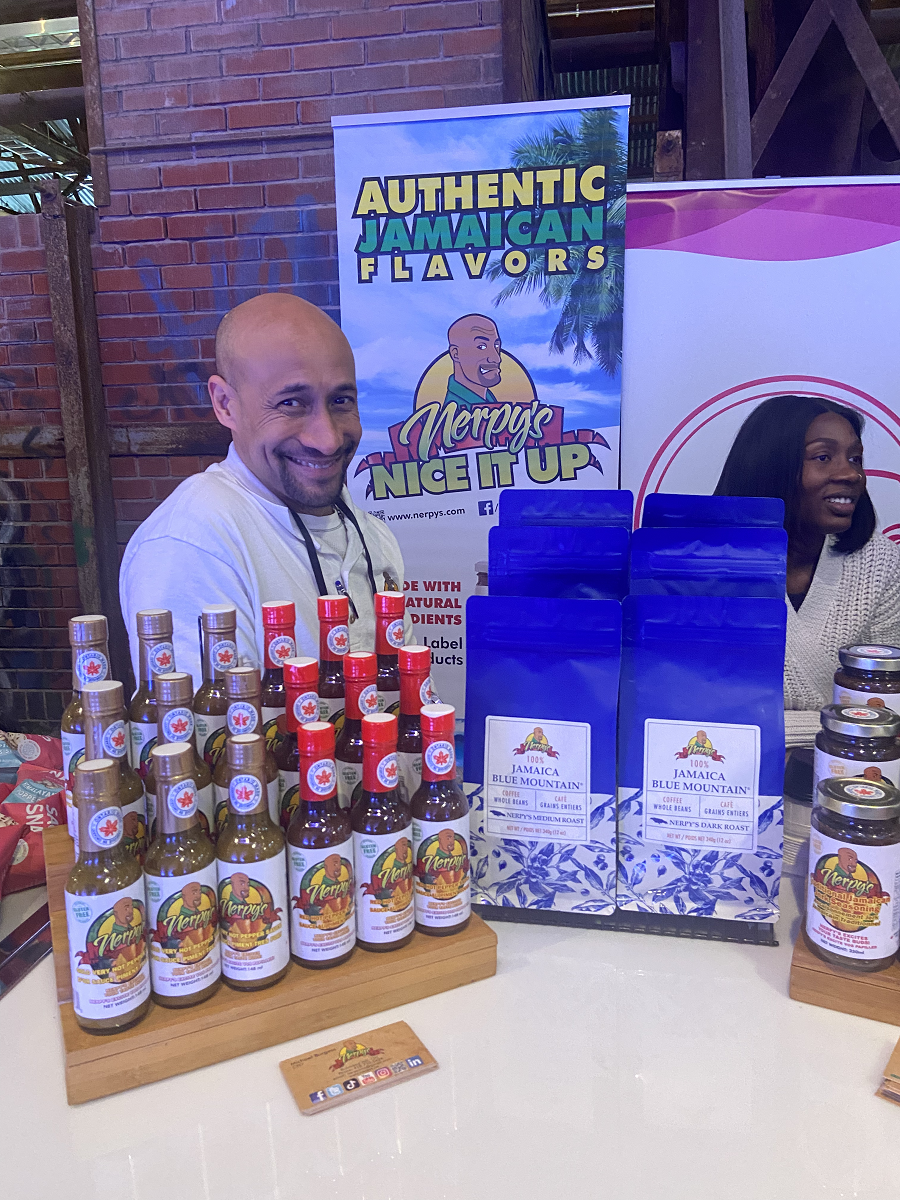
Foodpreneur Lab is shaping the future of food entrepreneurship, one success story at a time. We stand at the heart of Ontario’s food ecosystem, creating pathways for underrepresented and racialized entrepreneurial communities to thrive. The journey of Nerpy’s Inc. shows what’s possible when community, innovation and opportunity come together.
Janice Bartley, founder and executive director of the Foodpreneur Lab
Janice Bartley was awarded the 2024 Excellence in Agriculture Award for her work establishing the non-profit organization. With more diverse food businesses emerging in Ontario’s local food sector, this organization enriches the province’s food landscape, promotes economic growth and cultural diversity and nurtures innovation.
Molinaro’s Pizza
For 61 years, Molinaro’s has been rooted in tradition and committed to quality. When Gino Molinaro immigrated to Canada in 1956, he began making bread at Dempster’s. Learning a lot about dough, he formed his first pizza-making business in 1964, named Canadian Pizza Crust Canada. He continued to expand the business, first to a national level and then expanded the business to the United Kingdom, opening Canadian Pizza Crust UK in 1985.
When selling Canadian Pizza Crust Canada in 1986, it seemed like the end of the story, but Gino reacquired it from Heinz in 1993 and renamed it Molinaro’s Fine Italian Foods, just after selling Canadian Pizza Crust UK in 1992.
Beginning in 1993, Gino’s sons Vince and then Frank started with the business and eventually took over in 2015. Currently, they have a 105,000 square foot operation that makes pizza shells and dough for the retail and food service sectors as well as a 125,000 square foot warehouse located in Oakville.
This local food entrepreneur specializes in customized deli and frozen pizza programs for many small and large retail chains. They source ingredients from local Ontario companies like P&H and ADM Milling (flour), Gay Lea and Saputo (cheese) and Venetian Meats and Fresh House Foods (meat toppings). For Molinaro’s, local food means the best ingredients go into making the best pizzas, pizza crusts, flatbreads and shelf-stable pizza kits.

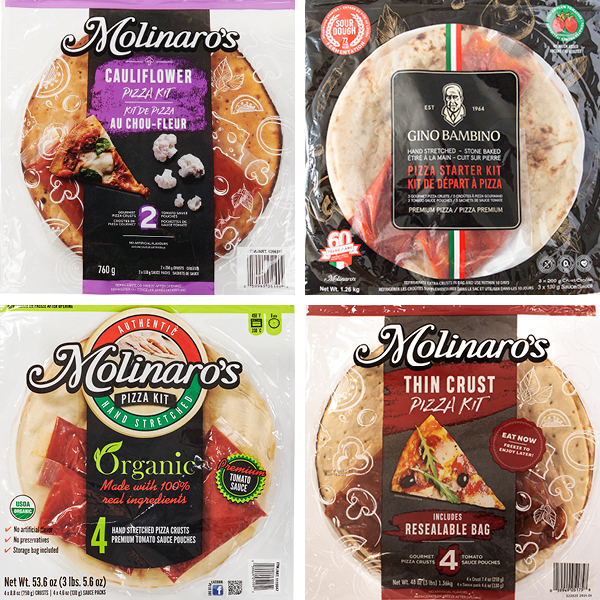
We are a custom producer of pizza products and quality is our family tradition.
Vince Molinaro, president of Molinaro’s Fine Italian Foods Ltd.
At the heart of their success is high-quality products with competitive prices. They also provide organic, halal, gluten-free and keto-certified options to ensure all the markets are covered. They are currently the largest and only Canadian pizza manufacturer that can produce products from start to finish. From dough balls to the final fully topped pizzas, Molinaro’s continues to look for ways to grow their business. Most recently, Molinaro’s partnered with OMAFA to participate in the 2025 Restaurants Canada show and had several successful business-to-business meetings with buyers to continue to help support the tremendous growth of their business.
Expanding access to local food in the broader public sector
Ontario’s broader public continues to grow opportunities that incorporate local food into the menus of universities, long-term care facilities and hospitals, daycares and school cafeterias. We support this type of work through Supply Ontario’s Building Ontario Business Initiative (BOBI) that allows institutions to evaluate vendor-based criteria, such as local knowledge, local benefits and supply chain security. Hiring more Ontario agri-businesses and sourcing more Ontario food products helps to support Ontario businesses and achieve the Grow Ontario Strategy goal to increase local food production and consumption.
Buying local for organizations is easy with value-based procurement
There is a common misconception that buying local food is more expensive. However, it is often as cost-effective or lower in cost than buying imported food. For MEALsource, they know firsthand how important it is to source locally grown and made food for their institutional members. Through value-based procurement, institutions can look beyond price and emphasize other important factors like supporting regional economies, sourcing food from Indigenous communities, or ensuring the procurement of food is sustainable or culturally appropriate.
MEALsource is the Nutrition Procurement Division of Mohawk Medbuy (MMC) a not-for-profit shared service organization that facilitates contracts for food products on behalf of more than 50 member hospitals and other health care facilities here in Ontario, as well as 5 lead agencies that are responsible for procuring food for Ontario’s Student Nutrition Program.

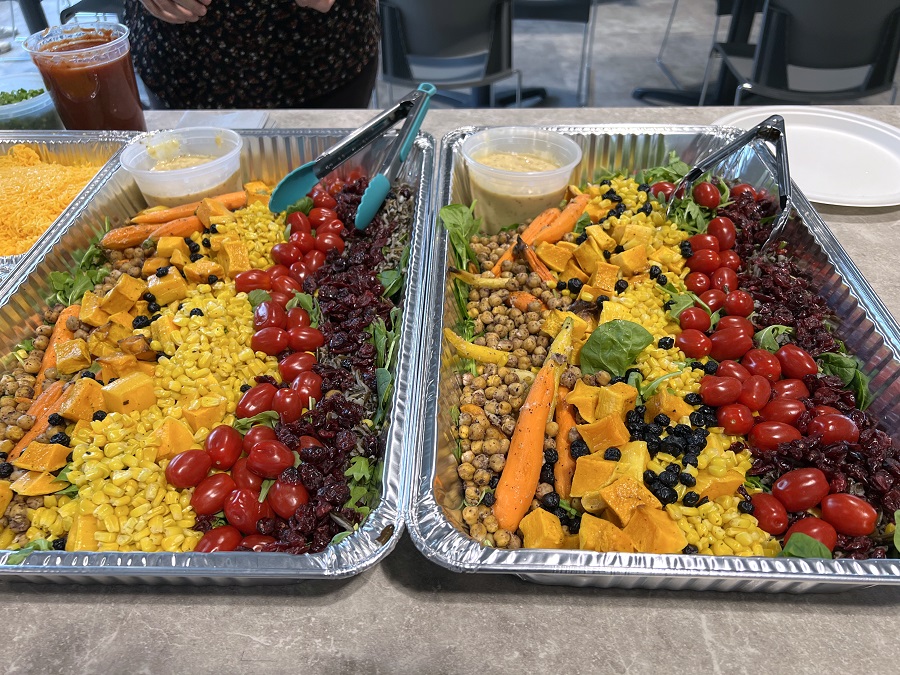
MMC’s MEALsource team leverages the combined purchasing power of all its member organizations to help reduce costs – providing them with a wide range of products from a broad network of suppliers. Additionally, by applying values-based procurement, MEALsource can engage and educate Ontario food suppliers to be more successful through the bidding and evaluation process.
Working in partnership with domestic vendors, our distribution partners and the team at OMAFA, MEALsource looks to bring public foodservice closer to home. By lowering food miles, procuring with intention and evaluating bid submissions using the parameters set out by the Ontario government, public money can and should support a resilient, sustainable and competitive food system where producers can thrive and Ontarians are nourished.
Candice Bird, Director of MMC’s MEALsource service line
As set out through the province’s BOBI Act, 2022, MEALsource evaluates suppliers according to community economic, social, or sustainability criteria when choosing vendors that meet the needs of their institutional members. By doing so, MEALsource has been a strong champion for local food procurement, holding contracts with over 40 Ontario vendors. Annually, their hospital members spend approximately $3 million per year on Ontario fruits and vegetables!
Institutions that employ values-based procurement support positive impacts within their organization and the broader society. It encourages institutions to define terms like “locally sourced” and align them with their strategic priorities, budgets and performance measures by learning about the food system, local growers and government procurement directives.
AgriTech North
AgriTech North is an example of the entrepreneurial spirit thriving within the agri-food community in Northern Ontario. Based in Dryden, this innovative social enterprise is a research and development centre and living lab focusing on innovative technologies to enhance sustainability, food security and affordability in Canada's northern and remote areas, including Indigenous communities.
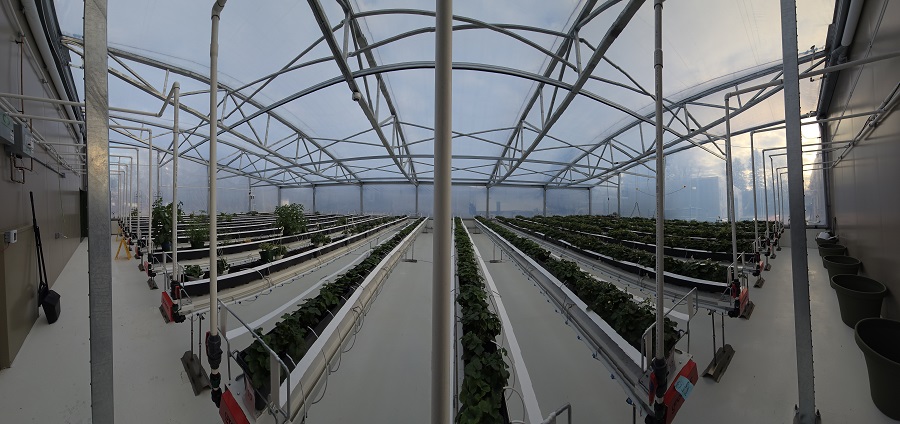
AgriTech North is making a substantial impact on Canadian food systems by enabling commercially viable year-round growing in every region of Canada for the first time in history. They are doing this by employing innovative technologies like the new greenhouse envelopes cutting heating costs by more than 50% when compared to double-pane glass, hydronic microclimate controls that cut A/C and Dehumidification energy by 75% and direct air capture (DAC) that turns greenhouse carbon emitters into carbon sinks. These innovations will increase the annual greenhouse market by at least $1.9 billion and create over 150,000 jobs. Nationally, these new innovations could enable Canada to grow 100% of its food demand from within our borders.
In addition to their innovative growing systems, AgriTech North also makes available Indigenous harvested food products such as wild rice, 1 source of which is grown in the waters of Trout Lake by Flying Wild Rice Co. The wild rice is not only a nutritious and healthy food option but also a product with deep Indigenous roots, carrying on the tradition of communities who have harvested this staple food for centuries. They have also expanded their market to healthcare facilities, such as Unity Health Toronto which has incorporated wild rice into their patient menu to create power bowls (made up of whole grains, vegetables and proteins) that are both filling and nutritious.
Our academically validated technologies are enabling, for the first time, for all Canadians to be food secure, to grow 100% of our fresh food demands from within our borders. Knowing that these technologies are the first-time greenhouse envelopes and related systems have been innovated upon in over 50 years and are validated to end rural, remote, Indigenous and Canadian food insecurity, keeps us going. We grew up in Northwestern Ontario, where we have experienced food insecurity our entire lives. These technologies were developed out of necessity to end the inequality of Northern, rural, remote and Indigenous community living, ensuring all peoples have access to fresh, healthy foods. While larger operations also stand to benefit to even greater magnitudes, the challenges in agriculture, when it comes to commercial viability, are at small scale, in rural and remote communities.
Benjamin Feagin Jr., CEO AgriTech North
By reinvesting profits into Indigenous community initiatives, they are also supporting local employment. For their efforts, they have been recognized through RBC’s FuturPreneur Emerging Indigenous Entrepreneur Award and the 2023 Excellence in Agriculture Award from OMAFA. More recently, AgriTech North has also received over $850,000 in funding support through the Northern Ontario Heritage Fund Corporation and over $1 million from Agriculture, Agri-Food Canada.
Growing future success through innovation
Research, innovations and cutting-edge technologies drive Ontario’s agri-food system. Investing in programs, projects, knowledge transfer and commercialization means that Ontario farmers, food processors and agribusinesses have the tools needed to:
- boost productivity
- grow businesses
- create jobs
- strengthen the economy
The Grow Ontario Strategy set out goals to increases agri-food innovation and commercialization in Ontario so that our local food system will be stronger and more agile and able to face challenges as they arise.
Ontario-led research benefits Ontario farmers and food businesses within the province first. New technology and process that are developed, tested and adopted here in Ontario, give our farmers and food businesses fast, targeted and tested solutions that help them be more competitive, profitable and resilient.
CRF Agritech
Soil and fertilizer are 2 key components needed to grow most of the more than 200 different commodities in Ontario and our local food system depends on them. In response to supply challenges, we launched the Fertilizer Accelerating Solutions and Technology (FAST) Challenge to ensure Ontario farmers could access alternative fertilizer solutions within the sector. As part of the Grow Ontario Strategy, the FAST Challenge invested up to $2 million to support Ontario made solutions to increase the availability of fertilizer options, alternatives and technology. This investment helps ensure that farmers have the tools they need so that Ontarians can rely on a safe, stable and growing food supply.
Bioenterprise Canada, a national non-profit business accelerator, delivered the FAST Challenge and CRF Agritech received $154,000 to speed up production and farmers’ adoption of the new generation of fertilizer technology. Located in St. Thomas, Ontario, the plant manufactures coated fertilizers, providing Ontario farmers with local access to an innovative product that promotes environmental, agronomic and economic progress in agriculture.
As a business based in Canada, we are proud to be a contributor to the prosperity of Canadian farmers. Our PurYield™ and PurKote™ products support responsible agricultural practices that are a must-have for our customers. Our plant’s strategic location allows for reliable supply in eastern Canada and reduces transportation costs, which is a substantial benefit to farmers in the region, enabling them to actively participate in local food production.
Mark Bryan, general manager, CRF Agritech

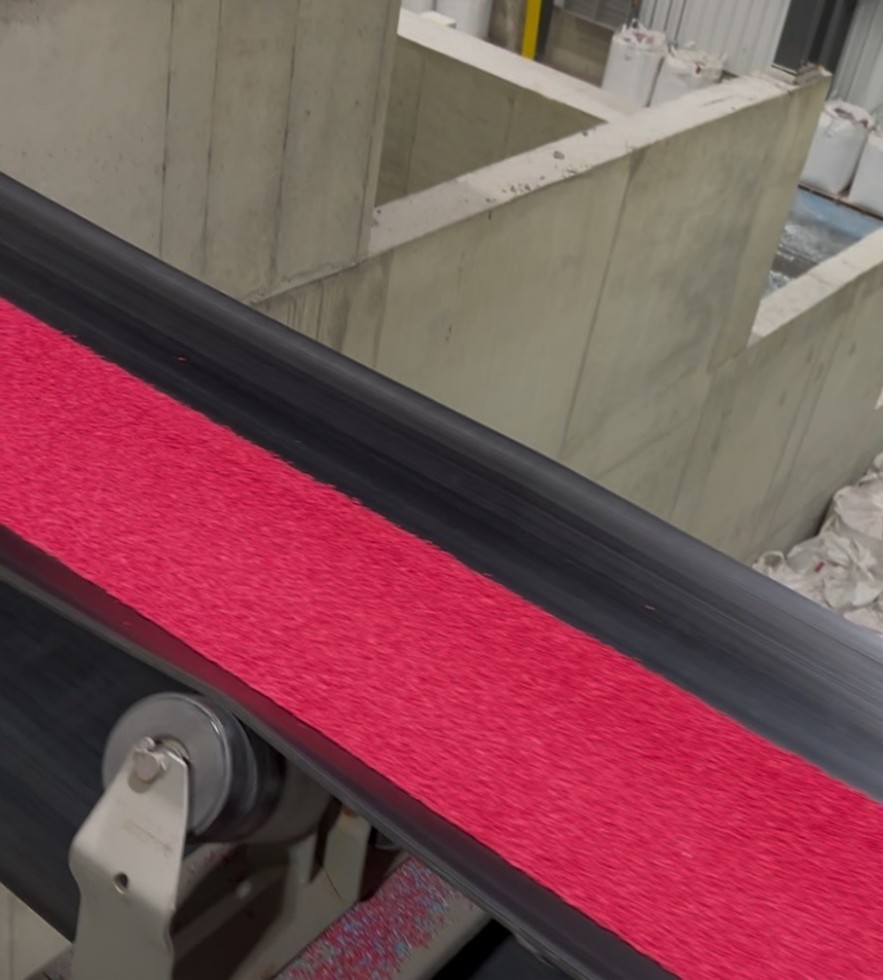
The patented coating technology, which can be applied to any type of fertilizer, including potassium and phosphorus, controls the release of nutrients as the plant grows, reducing the total amount of fertilizer applied to crops and contributing to more sustainable agricultural practices.
Bujold Farms
Bujold Farms, a family-operated farm located in Rainy River, Ontario, is a shining example of how research and innovation can drive success in the agri-food sector. This agribusiness specializes in breeding Herefords and commercial Angus cattle and has been recognized for its excellence and contributions to the industry, winning an Excellence in Agriculture Award in 2024 in the Northern Business Excellence category. One of the key areas where Bujold Farms has made significant strides is in improving beef cattle genetics. Aaron Bujold, a leading figure at the farm, has been instrumental in advocating for and implementing advanced breeding technologies.
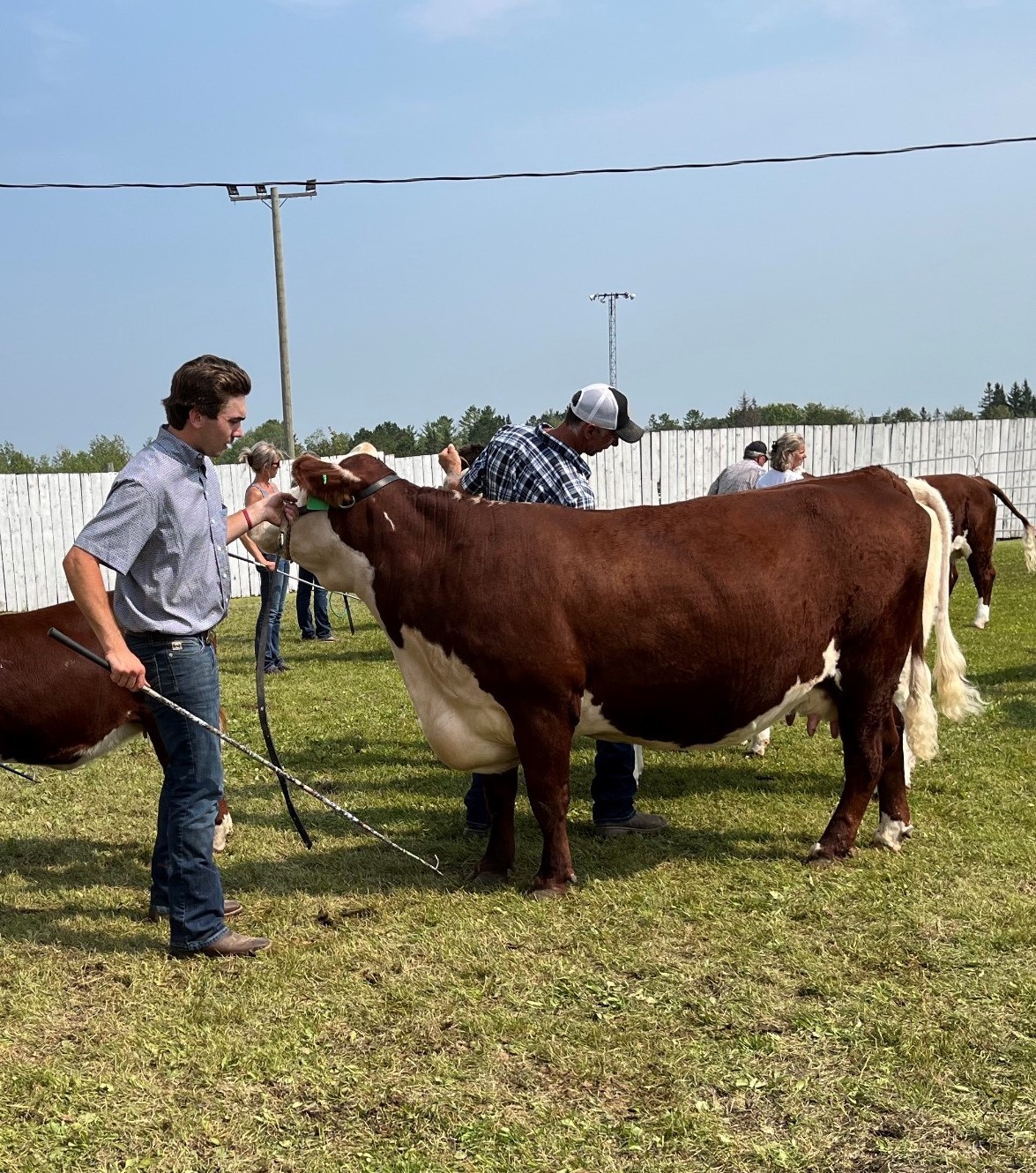
I enjoy what I do everyday and look forward to the future in agriculture. I enjoy working with livestock and the land. It’s truly the best field to be a part of.
Aaron Bujold, owner, Bujold Farms
Innovation at Bujold Farms extends beyond genetics. The farm is committed to sustainable practices that ensure long-term viability and environmental stewardship. By adopting precision agriculture techniques and sustainable grazing practices, Bujold Farms minimizes its environmental footprint while maximizing productivity. These efforts align with broader goals of sustainability within Ontario's agri-food sector, demonstrating that innovation and environmental responsibility can go hand in hand. As the industry continues to evolve, the example set by Bujold Farms highlights the critical role that research and innovation play in driving progress and ensuring a prosperous future for agriculture in the province.
Summary
Ontarians rely on our local agri-food industry for a secure supply chain of healthy, high-quality foods. Communities across the province depend on the 871,000 jobs created by the agriculture and food industry and we all benefit from the nearly $51 billion it contributes to Ontario’s economy. We are committed to protecting our farmers, food businesses, processors and agribusinesses. By working together, we can build a stronger, more resilient, self-sufficient food supply chain for everyone.